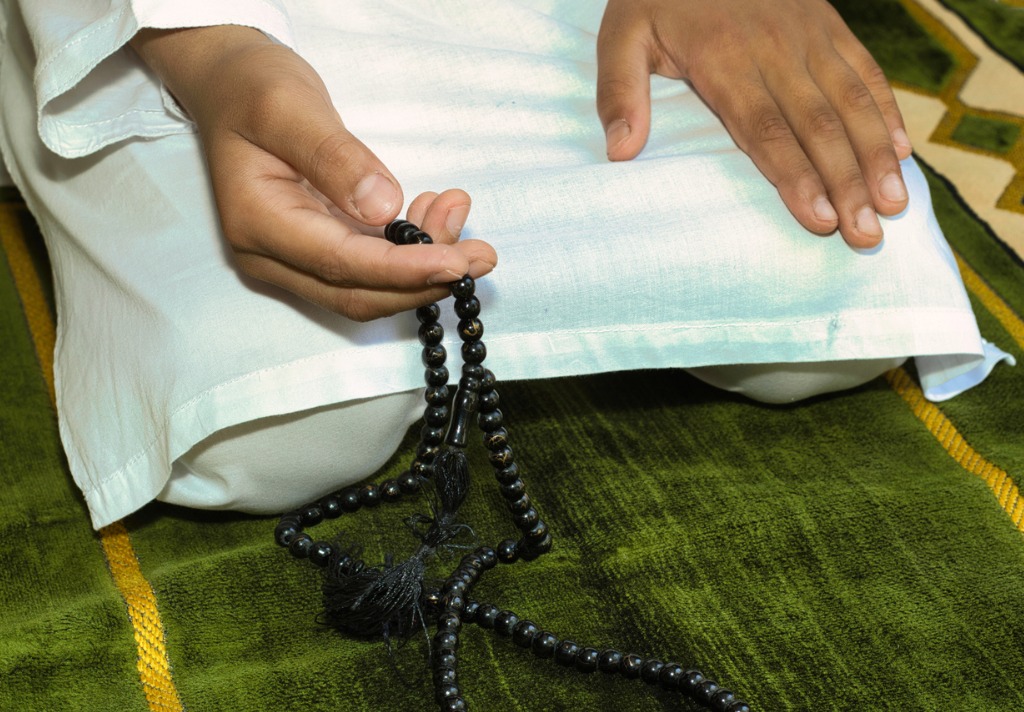What is Allahumma Antas Salam (Anta el Salam) Dua?
Are you curious about the significance of the “Allahumma Antas Salam” Dua?
In this article, we will explore the meaning, pronunciation, and importance of this powerful Dua. Get ready to discover the peace and blessings that come from reciting it after every Fard prayer!
The Full Dua in Arabic and its English Translation


The full Dua in Arabic is “اللَّهُمَّ أَنْتَ السَّلَامُ وَمِنْكَ السَّلَامُ تَبَارَكْتَ يَا ذَا الْجَلـالِ وِالإکرام.”
This phrase carries deep meaning…
The translation of this powerful Dua in English is as follows:
“O Allah, You are Peace, and from You comes peace. Blessed are You, O Owner of Majesty and Honor.” Jami` at-Tirmidhi 298
This Dua is a magnified declaration of faith and surrender to God. It denotes that genuine peace comes solely from Allah SWT, confirming His supreme majesty and honor.
It sows peace in one’s heart while demonstrating reverence for Allah SWT’s absolute loftiness.
Muslims, for example, recite this Dua frequently because it is essential in their daily lives. After every Fard (obligatory) prayer, its inclusion reinforces the importance of seeking peace only from its authentic source: Allah SWT.
By keeping their focus on the ultimate Giver of Peace Himself, such utterances cultivate an enduring state of serenity within practitioners over time.
- For most accurate Athan and Prayer times, please click here
The Pronunciation and Transliteration of the Dua


The correct pronunciation of the Dua is essential for proper recitation. It contributes to the integrity and meaning of the Arabic prayer, which is one aspect that makes it necessary for Muslims worldwide.
The English transliteration of this Dua is written as “Allahumma antas-salam, wa minkas-salam, tabarakta ya dhal jalali wal-Ikram.” This transliteration serves as a phonetic guide, assisting in correctly pronouncing each syllable of this profound invocation.
If you still find it difficult to pronounce this Dua then watch this video:
(7) Allahumma Antas Salam Full Dua Pronunciation & Meaning | Dua after Salah – YouTube
Accurate pronunciation brings us closer to understanding and communicating with Allah SWT. Quran teachers frequently demonstrate proper enunciation techniques to assist non-Arabic speakers.
- Download Muslim Sadiq app, and enjoy all top-notch features for everyday activities!
The Meaning and Significance of the Dua
This Dua holds profound meaning and significance. It declares Allah SWT to be the source of all peace, recognizing His perfection and the lack of flaws or shortcomings.
This recitation acknowledges that peace comes only from Him, reflecting a profound surrender to our Creator.
Many Muslims recite this Dua after every Fard prayer, asking for forgiveness for any shortcomings or mistakes made during their prayer time.
Finally, its daily repetition promotes mindfulness in prayers while reminding worshippers of their reliance on Allah SWT’s peace to navigate life’s challenges.
- Read Al Quran along with interpretation in the easiest way possible by clicking here
The Hadith Source and Commentary for the Dua


This Dua is firmly established in Islamic tradition, featuring prominently in Hadith Sahih Muslim 591. This revered text contains a narration from Thauban, a companion and servant of the Prophet Muhammad (PBUH).
He observed that after completing every Fard prayer, the Prophet PBUH would seek forgiveness from Allah SWT by saying “Astaghfiru Allah” three times and then reciting this full Dua.
Conclusion
The “Allahumma Antas Salam” Dua energizes spiritual tranquility. It assists us in connecting with our faith, fostering internal peace, and surrendering to Allah SWT. Furthermore, it enables us to identify and seek forgiveness for any shortcomings in our prayer.
This Dua aligns one’s heart with divine serenity, emphasizing the significance of peace in Islam.
- Islamic holidays and important dates are listed here
FAQs
How do I use this Dua in my prayer?
At the end of your prayer, you say “As-salamu alaykum warahmatullah,” after that recite “Astaghrifullah” Dua three times, followed by the “Allahumma Antas Salam” Dua to seek forgiveness for any deficiencies and errors in your prayer.
Are there other similar Duas?
There are many similar Duas; some examples include ‘Bismika Allahumma Amutu Wa Ahya,’ ‘Sayyidul Istighfar,’ ‘HasbunAllahu Wa Ni’mal Wakeel,” Allahummaj’Alna Minhum,’ ‘Allahuma Ajirni Minan Naar,’ and ‘Allahuma Ainni Ala Dhikrika wa Shukrika wa Husni Ibadatik,”
ما هو الدعاء اللهم أنتس السلام (أنت السلام)؟
هل أنت مهتم بمعرفة أهمية دعاء "اللهم أنطس السلام"؟
في هذه المقالة، سوف نستكشف معنى هذا الدعاء القوي ونطقه وأهميته. استعد لاكتشاف السلام والبركات التي تأتي من قراءتها بعد كل صلاة فرض!
الدعاء كاملا باللغة العربية وترجمته الإنجليزية


الدعاء الكامل باللغة العربية هو "اللَّهُم أَنْتَ السَّلَامُ وَمِنْكَ السَّلَامُ تَبَارَكْتَ يا ذَا الْجَلـالِ وِالإکرام."
هذه العبارة تحمل معنى عميقًا...
ترجمة هذا الدعاء القوي باللغة الإنجليزية هي كما يلي:
"اللهم أنت السلام ومنك السلام تباركت يا ذا الجلال والإكرام." جامع الترمذي 298
هذا الدعاء هو إعلان عظيم عن الإيمان والاستسلام لله. ويدل على أن السلام الحقيقي لا يأتي إلا من الله سبحانه وتعالى، مما يؤكد جلالته وإكرامه.
إنها تزرع الطمأنينة في قلب المرء وتظهر احترامًا لعلو الله سبحانه وتعالى.
المسلمون، على سبيل المثال، يقرأون هذا الدعاء بشكل متكرر لأنه ضروري في حياتهم اليومية. بعد كل صلاة فرض، فإن إدراجها يعزز أهمية طلب السلام فقط من مصدره الحقيقي: الله سبحانه وتعالى.
من خلال الحفاظ على تركيزها على مانح السلام المطلق نفسه، تعمل مثل هذه الأقوال على تنمية حالة دائمة من الصفاء داخل الممارسين مع مرور الوقت.
- للحصول على أدق أوقات الأذان والصلاة، يرجى النقر هنا
نطق الدعاء وترجمته


النطق الصحيح للدعاء ضروري للتلاوة الصحيحة. فهو يساهم في سلامة ومعنى الصلاة العربية، وهو أحد الجوانب التي تجعلها ضرورية للمسلمين في جميع أنحاء العالم.
الترجمة الصوتية الإنجليزية لهذا الدعاء مكتوبة على النحو التالي: "Allahumma antas-salam, wa minkas-salam, tabarkta ya dhal jalali wal-ikram." تعمل هذه الترجمة الصوتية كدليل صوتي، مما يساعد في نطق كل مقطع لفظي من هذا الدعاء العميق بشكل صحيح.
إذا كنت لا تزال تجد صعوبة في نطق هذا الدعاء، فشاهد هذا الفيديو:
(7) اللهم أنتاس سلام الدعاء كامل النطق والمعنى | دعاء بعد صلاح - يوتيوب
https://www.youtube.com/watch?v=z2h5poJwaBwالنطق الدقيق يجعلنا أقرب إلى الفهم والتواصل مع الله سبحانه وتعالى. كثيرًا ما يُظهر مدرسو القرآن أساليب النطق الصحيحة لمساعدة الناطقين بغير اللغة العربية.
- قم بتنزيل تطبيق مسلم صادق، واستمتع بجميع الميزات المتميزة للأنشطة اليومية!
معنى الدعاء وأهميته
هذا الدعاء يحمل معنى وأهمية عميقة. ويعلن أن الله سبحانه وتعالى هو مصدر كل سلام، ويعترف بكماله وخلوه من العيوب والنقائص.
تعترف هذه التلاوة بأن السلام يأتي منه فقط، مما يعكس الاستسلام العميق لخالقنا.
يقرأ العديد من المسلمين هذا الدعاء بعد كل صلاة فرض، ويطلبون المغفرة عن أي تقصير أو أخطاء ارتكبوها أثناء وقت الصلاة.
أخيرًا، تكرارها اليومي يعزز اليقظة الذهنية في الصلاة مع تذكير المصلين باعتمادهم على سلام الله سبحانه وتعالى في التغلب على تحديات الحياة.
- اقرأ القرآن مع التفسير بأسهل طريقة ممكنة بالضغط هنا
مصدر الحديث وتفسير الدعاء


هذا الدعاء راسخ في التقليد الإسلامي، ويظهر بشكل بارز في حديث صحيح مسلم 591. يحتوي هذا النص الموقر على رواية عن ثوبان صحابي وخادم النبي محمد (ص).
ولاحظ أنه بعد الانتهاء من كل صلاة فرض كان النبي صلى الله عليه وسلم يستغفر الله سبحانه وتعالى ويقول "استغفر الله" ثلاث مرات ثم يقرأ هذا الدعاء كاملا.
الاستنتاج
دعاء "اللهم أنطس السلام" ينشط الطمأنينة الروحية. فهو يساعدنا على التواصل مع إيماننا، وتعزيز السلام الداخلي، والاستسلام لله سبحانه وتعالى. علاوة على ذلك، فهي تمكننا من التعرف على أي تقصير في صلاتنا والاستغفار له.
يربط هذا الدعاء قلب المرء بالصفاء الإلهي، ويؤكد على أهمية السلام في الإسلام.
- الأعياد الإسلامية والتواريخ المهمة مدرجة هنا
الأسئلة الشائعة
كيف أستخدم هذا الدعاء في صلاتي؟
في نهاية صلاتك تقول "السلام عليكم ورحمة الله" ثم تقرأ دعاء "استغفر الله" ثلاث مرات، يليه دعاء "اللهم أنطس السلام" واستغفر من أي تقصير أو خطأ في صلاتك.
هل هناك أدعية أخرى مشابهة؟
وهناك العديد من الأدعية المشابهة؛ تتضمن بعض الأمثلة "بسم الله الرحمن الرحيم وأهيا" و"سيد الاستغفار" و"حسبنا الله ونعمل وكيل" و"اللهماج ألنا منهم" و"اللهم أجرني منان نار" و"اللهم عيني على ذكرك وشكرك وحسني إباضيتك". ,''







